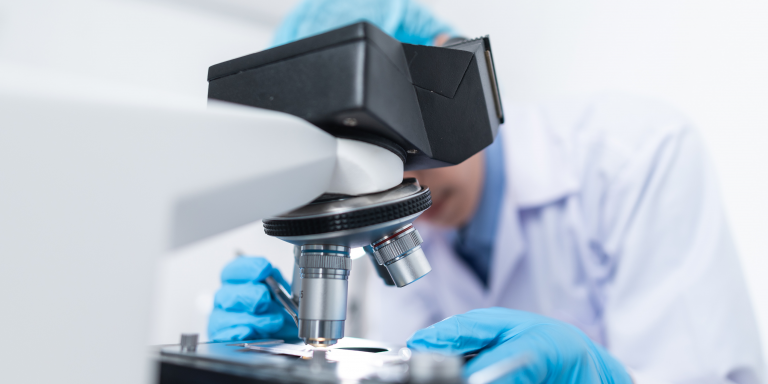
A team of researchers from the University of Antwerp wanted to know if certain white blood cells, the T lymphocytes, played a role in the immune response to vaccines. Using Artificial Intelligence, they were able to show that CD4 T cells accelerate immunity after a primary vaccination against hepatitis B. They published the results of their study titled: “Pre-existing memory CD4 T cells in naive individuals confer robust immunity to hepatitis B vaccination.” in the journal eLife.
The research team consisted of members from various laboratories and departments at the University of Antwerp: the Laboratory for Experimental Hematology (LEH), Institute of Vaccines and Infectious Diseases, the Antwerp Unit for Data Analysis and Computation in Immunology and Sequencing, the Adrem Data Lab, Department of Mathematics and Computer Science, the Department of Medical Genetics, the Center for Health Economics Research & Modeling Infectious… among many others. The researchers studied the role of T cells, major players in the adaptive immune response during infections, in vaccination. Prof. Benson Ogunjimi, a specialist in pediatric rheumatology and immunology, explains:
” The role of T cells in vaccination is still too often underestimated. Vaccine immunity is primarily attributed to antibodies produced by B cells .
CD4 T cells
Immune cells called CD4 T cells help the body develop immunity to infections caused by bacteria and viruses, or after vaccination. Receptor proteins on the outside of the cells recognize pathogens, foreign molecules called antigens or vaccine antigens. Vaccine antigens are usually inactivated bacteria or viruses, or fragments of these pathogens. After recognizing an antigen, CD4 T cells become memory CD4 T cells ready to defend against future infections by the pathogen.
People who have never been exposed to a pathogen, or who have never been vaccinated against it, may still have pre-existing memory cells ready to defend against it. This occurs because CD4 T cells can recognize multiple targets, allowing the immune system to be ready to defend against both new and familiar pathogens.
The role of artificial intelligence
To find out whether having pre-existing memory CD4 T cells confers an advantage for vaccine-induced immunity, the researchers assembled a cohort of thirty-four people who had never been exposed to or vaccinated against hepatitis B. These individuals provided blood samples before vaccination, then with 2 doses of hepatitis B vaccine, and 3 times thereafter. Using next-generation immune sequencing and machine learning techniques, the researchers analyzed the individuals’ memory CD4 T cells before and after vaccination. Dr. Pieter Meysman, a megadata expert, explains:
” Each individual has a unique set of T cells, which are even different between two univitelline twins. This makes it extremely difficult to map this facet of the immune system using conventional genomic techniques. We taught computers to understand the genetic language of T cells and to decode it into an individual-level immune map – an extremely complex challenge that we were able to overcome after nearly seven years of research (funded by the University of Antwerp) with a team that included vaccinologists, immunologists, geneticists and computer scientists. “
The experiments showed that pre-existing memory CD4 T cells can determine vaccination outcomes, and people with more pre-existing memory cells develop faster and stronger immunity after hepatitis B vaccination. This information can help scientists better understand how people develop immunity to pathogens. This can guide them in developing better vaccines or predict who will develop immunity after vaccination.
A wide range of potential applications
The researchers formed ImmuneWatch to accelerate the development of T-cell-based diagnostic tools and therapies. Their mission is to ” make immune repertoire data interpretable and actionable by annotating T cell receptors in a clinically meaningful way.” Prof. Kris Laukens, bioinformatician says of the company:
” It will allow us to offer our technology to society at a scale that is beyond the reach of a university. It is clear to us that this technology opens up a wide range of potential applications. In the future, for example, we intend to develop entirely by computer – as a prerequisite to clinical trials – a safe and effective vaccine that could even be tailored to each individual, without the need for animal studies. This technology could also be used to develop new treatments for cancer or various autoimmune diseases, in which T cells also play a major role. “
Article source: eLife 2022;11:e68388.
Authors: George Elias, Pieter Meysman, Esther Barthélemy, Nicolas de Neuter, Nina Keersmaekers, Arvild Suls, Hilde Jansens, Aïcha Souquette, Hans De Reu, Evelien Smits, Eva Lion, Paul G Thomas, Geert Mortier, Philippe Beutels, Viggo Van Tendeloo, Benson Ogunjimi, Marie-Paule Emonds, Pierre Van Damme, Kris Lauken.
Translated from Des chercheurs de l’Université d’Anvers étudient le rôle des lymphocytes T grâce à l’Intelligence Artificielle









